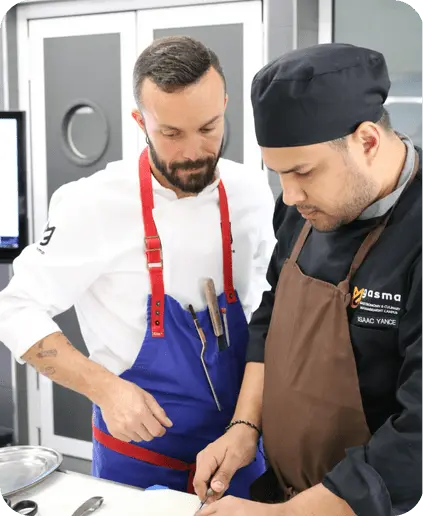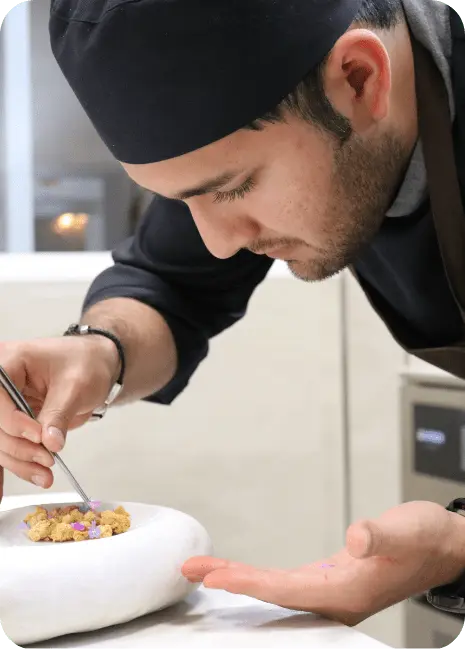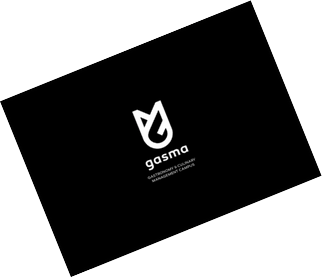
Knowing the physical, chemical and sensory composition of the product is essential to acquire technical skills in gastronomy. Students will learn how food molecules interact and how to apply this understanding to their work methodology in the kitchen.
Module sessions:
Food components
Physicochemical behaviors in food
Macronutrients
Raw materials
In this block, various groups of raw materials will be classified and studied, including their production or cultivation techniques and their culinary manipulation. Students will learn to identify the organoleptic characteristics of each product and its corresponding gastronomic application.
Module sessions:
Vegetables
Poultry
Veal
Pig
Lamb
Hunting animals
Fish
Seafood
Offal in haute cuisine
It is essential for contemporary cooks to know the traditional and ancestral culinary techniques that are currently gastronomic trends. Within the context of Mediterranean cuisine, for example, we will see the importance of olive oil varieties and the tradition of Mediterranean rice dishes.
Module sessions:
Importance of EVOO in the restaurant industry
Pickles, salted and marinated products
Fermentations applied in the dining room and kitchen
Base coats, juices, extractions and glazes
Mediterranean rice dishes
In this module, we will explore the latest tools and machinery available on the market for application in haute cuisine. In addition, we will use technological ingredients used in fine dining to modify food textures and achieve innovative and surprising results.
Module sessions:
Vacuum cooking techniques
Texturizers
Use of the siphon
Handling and application of liquid nitrogen
Enzyme behavior
State-of-the-art machinery in professional kitchens
This module will explore how diverse cultural influences have affected the European culinary landscape, and how chefs have adapted their culture and experience in different countries to suit the local palate, using ingredients and culinary techniques specific to each region.
Module sessions:
Japanese cuisine
Peruvian cuisine
Indian cuisine
Mexican cuisine
Italian cuisine
French cuisine
In this module, students will explore various gastronomic business models in Spain and discover products with designation of origin that make experiences unique. We will analyze different themes in culinary proposals, explore the environment, the organization and the inspirations behind the most recognized gastronomic offerings around the world.
Module sessions:
Seafood cuisine
Rural cuisine
Mediterranean haute cuisine
The world of sommeliers
This module begins by identifying the most common utensils used in charcoal cooking. We then compare the different types of wood and smoking techniques to understand the behavior of fire. We explore different cooking methods and examine the application of embers in seafood cooking and maturation of meat on grills. We also explore how restaurant pastry can use fire techniques.
Module sessions:
Professional grilling machinery
Smoke and types of wood
High quality meats and fish
Cooking pastry with embers
The Diploma's Final Project will allow you to put into practice all the knowledge acquired by presenting a personal gastronomic proposal, adapted to current market trends. This project is an exercise of integration of all the contents received.
Improve your training in restaurants and gastronomic businesses of national and international prestige, and increase your job opportunities. Learn from the best professionals and work in a team at the highest level.
Do your internship at Michelin, Repsol and 50 Best restaurants, and live the experience of working as part of a staff of chefs or pastry chefs in a high-level restaurant.
Learn the working methods and facilities that convey the culinary concept of the restaurant.
Cook alongside world-renowned chefs to enhance your resume and immerse yourself in haute cuisine on a global level.

Your passion and your talent deserve the best system to develop, and that is precisely what we offer you: a learning model that transcends conventional classrooms.
In our diploma in contemporary cuisine, we embrace the "learning by doing" methodology whereby theory comes to life through your hands and senses, turning each lesson into a unique opportunity to explore, experiment and create.
Imagine an environment where ingredients, pots and pans become tools of expression. In each class, you'll be immersed in the action; from mastering precise cuts to creating signature dishes that stir emotions. Every seasoning, every texture and every presentation will be the palpable result of your effort and dedication.
You will learn as you create, honing your skills in real time. What better way to internalize culinary techniques than by putting them into direct practice?
The "learning by doing" methodology not only accelerates your learning, but also cultivates self-confidence. It's not just about listening and remembering, it's about experimenting and creating.
If you are looking for an eminently practical training that will help you unlock your full gastronomic potential, you are in the right place: join us and start creating your own culinary stories from day one!


Would you like to perfect your technique in a 3-star Michelin restaurant, develop innovative projects in avant-garde restaurants, experience all the possibilities of sweets in the most exquisite pastry shops?
Done! We have more than 255 internship agreements with major companies in the sector to give you all the opportunities you deserve.
You will be able to spend 2 full months in the best restaurants in the world working side by side with renowned chefs and ultra-prepared teams.
In those two months of total immersion, you will not only learn recipes and techniques; you will become part of an efficient gastronomic team, absorbing all the knowledge of those who have worked their way to the top of the industry.
It will not only be a stage of your education, but a vital experience that will fill your memories with unique experiences and emotions.
Next call: September 2025
Classes: Information will be available soon
Practice period: Consult with your tutor
Format: On-site
Located: Castellón, Spain (see location)
Language: Spanish. Simultaneous translation into English.
Credits: 50 ECTS (Credit system)
Extras included in the registration fee:
If you already know that you want to study with us, enrolling in our training is very easy.
You must fill in the admission form that you can find in the button 'START ENROLLMENT'.
You will then receive an email confirming receipt of your application and we will contact you via email / call / whatsapp to move on to the next phase of the process: the interview with the Admissions Committee.
Within 24 hours of receiving your application, you will be scheduled for a personal interview* with a member of the Gasma faculty or admissions team.
The purpose of the interview is to get to know the candidates, and to assess their knowledge of the industry and their aptitude for the program.
In this interview, we will let you know if you need to provide any additional documents to complete your application.
* If you are unable to attend in person, the interview can also be conducted via Skype.
After the personal interview, the Admissions Committee will evaluate your application.
Once your application has been evaluated, we will inform you of the result.
If you have been accepted... Congratulations! The admission process has been completed.
In order to secure your place, it is necessary to formalize the payment of the reservation.
Once the place reservation is paid, we will review with you again the necessary documentation for your enrollment. Remember that you must have sent us the following information: ID/Passport, Resume or Letter of motivation and required academic documentation (if necessary).
Gasma is located in Castellón de la Plana (Valencian Community), Spain. The nearest airport is Valencia International Airport (70 km away). Our city is 2 hours by train from Barcelona and just under 3 hours from the capital of Spain, Madrid.
Gasma - Gastronomic Campus
Avenida Enrique Gimeno, 67
12006 Castellón, Spain, EU
Tel: +34 964 217 649
Our international student body continues to grow. We have students of more than 75 nationalities. European students do not need a visa to study in Spain. On the other hand, non-European students must obtain the corresponding visa that includes the authorization to stay in the country.
Students from certain countries are exempt from obtaining a visa as long as their stay in Spain does not exceed three months.
The visa will be requested and issued at the Spanish Consular Offices abroad. Once in Spain, Gasma offers non-EU students the optional International Fee service: with it, they can apply for the foreign student card through the Immigration Office or the corresponding police station within one month of their arrival.
To make your stay easier and more comfortable during your studies, Gasma has agreements with various organizations to provide our students with accommodation options nearby. In advance of your arrival you will be able to choose and reserve your accommodation in an apartment, student residence, etc. Contact our admissions department to clarify any doubts regarding this issue.
Yes, the Diploma in Contemporary Cuisine includes a two-month internship at the end of the course. This is where the best part of your training begins. We offer you the possibility of choosing your internship among the hundreds of agreements that Gasma has with restaurants, bakeries and gastronomic businesses throughout Spain and internationally.
You will be able to do your internship in capitals such as Barcelona, Madrid, Santiago de Compostela, Milan, London, in countries such as Austria, Denmark, USA, Canada, etc. You should know that many students get jobs as a result of their internships. It is a unique opportunity to create your own network of contacts in the sweet world.

